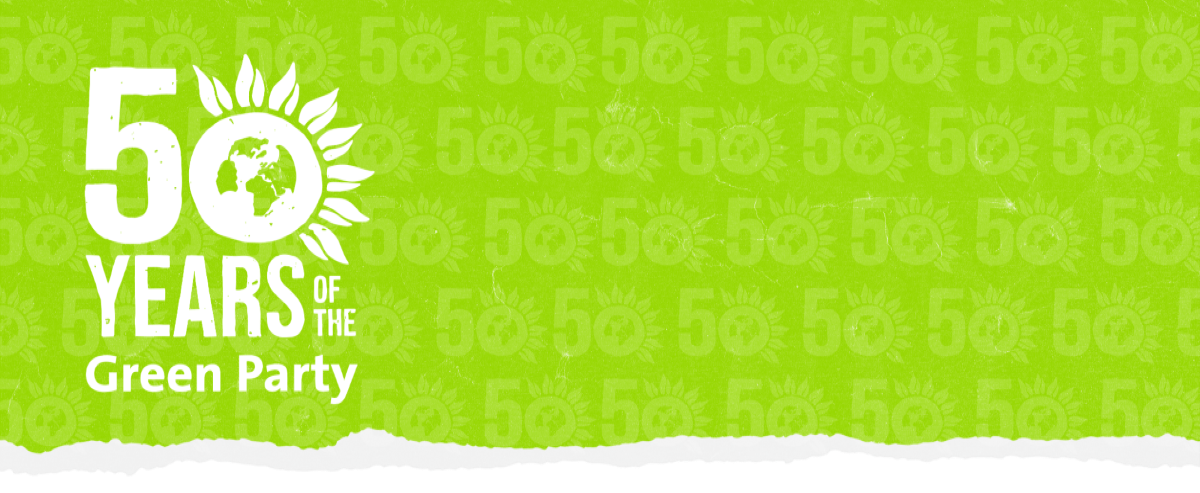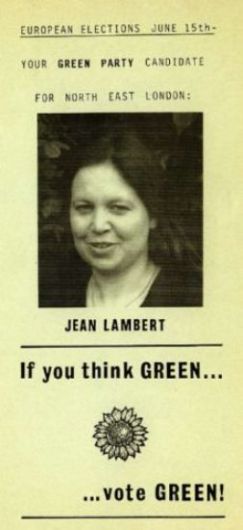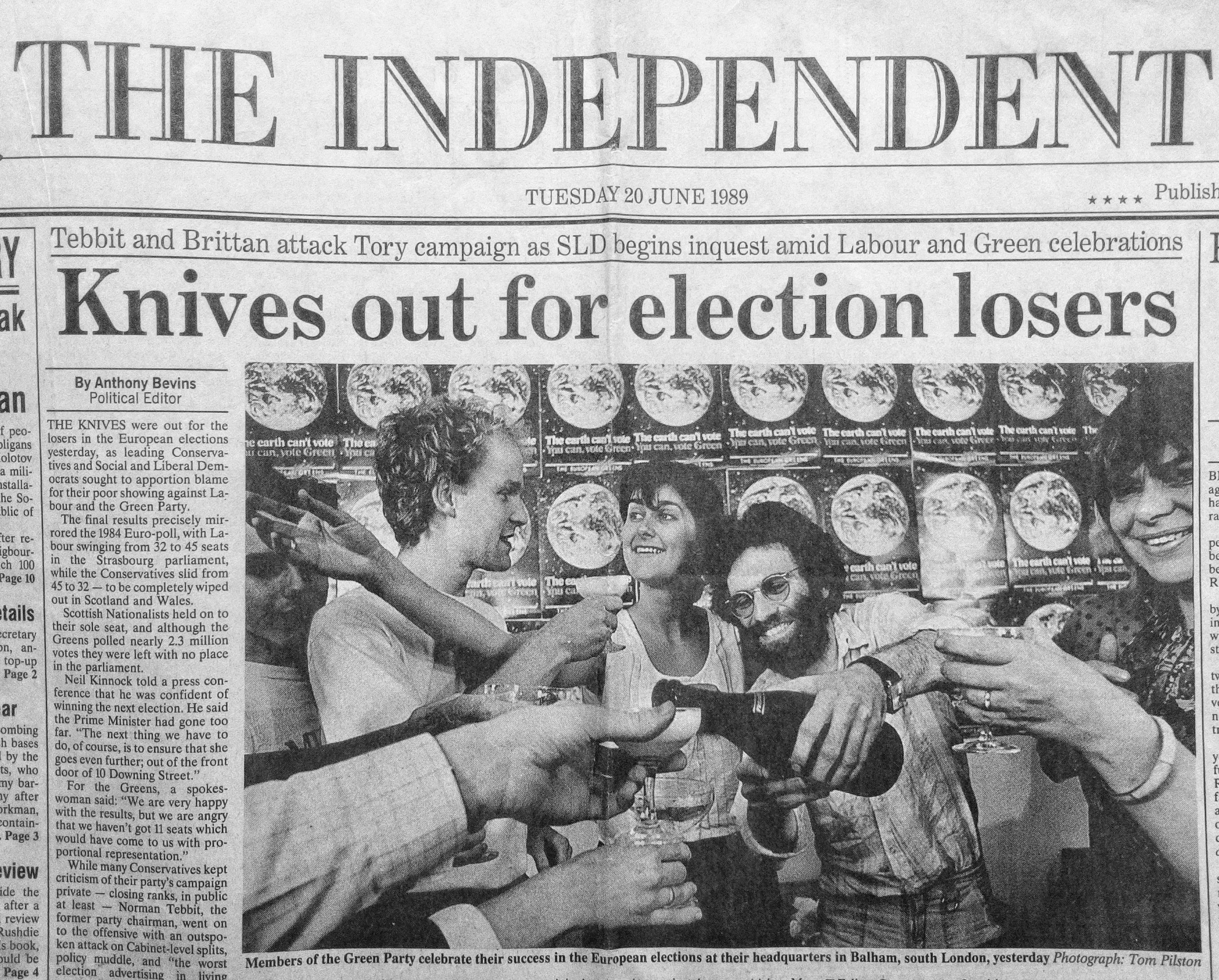|
|
"THE 2 MILLION PEOPLE WHO VOTED FOR US HELPED CHANGE THE POLITICAL AGENDA AND GAVE HOPE TO GREENS ACROSS THE WORLD"
Former MEP Jean Lambert shares her memories of one the party's greatest electoral breakthroughs when we gained a stunning 15 per cent of the vote.
In the European Election of June 1989 the UK Green Party gained nearly 15% of the vote – a result that shook national politics. Other parties were forced to recognise that the environment is political and that people were prepared to vote for a Party that promoted a sustainable future. The Party Conference season that autumn was full of green announcements from all parties. That marked a sea-change in UK politics and we should be proud of that as a Party.
I first realised that the election result was exceptional when, on voting day (ahead of the count on the following Sunday), Radio 4’s request to speak to me went from the usual couple of minutes on the phone, to being live in the studio for the rest of the programme. The exit polls had shown a ‘shock’ result. We were in third place nationally. I was on Radio 4’s election night coverage on the Sunday for the whole programme as the results came in and it was almost pure pleasure. I missed the champagne on Monday as I was back at work. |
|
However, that election result was no happy accident: it had come from a political context that was open to our very strong campaign. In autumn of 1988, the then-Prime Minister, Margaret Thatcher had made two speeches that raised the issues of climate change and the environment: the press wanted to know how the Green Party reacted and we were happy to tell them! The UK’s third party – the SDP/Liberal Alliance (now the Lib Dems) – was going through a fractious merger. Environmental pressure groups recognised the crucial role of EEC (now EU) legislation and ran campaigns on issues such as pesticides, water quality and air pollution which were picked up by the press and helped make voters aware of what the European Parliament could do. The Chernobyl nuclear disaster of 1986 was still in many people’s minds. |
|
|
We also ran a very strong, organised, nationwide campaign, which made the most of the opportunity. The Green Party had made a Conference decision to contest all 78 seats in the 1989 Euro elections run under first-past-the post. Northern Ireland used proportional representation. We felt this was a good election to increase public awareness of the Party. We could tell everyone they could vote Green. People could see the relevance of cross-border co-operation on the environment and we could link to the increasing awareness of Green political success on the continent – particularly in West Germany – to show that voting Green made a difference. The Single European Act of 1987 also gave us an opportunity for an economic critique of the EU.
The election deposits were £1000 per constituency (almost a bargain rate for this democracy tax) and gave us the right to use free-post to every household for our leaflets, if we could afford to print them. A full-slate ensured more media coverage and helped our case for getting any election broadcast – a tough negotiation. Our broadcast was stunning and has ranked in Politicos Top Ten. Directed by renowned photographer, David Bailey, it featured a bare studio where individual children felt the effects of pollution, with a series of positive policy messages appearing on screen: some call it the ‘Slime broadcast’. Our press conferences were well-attended and we gained the support of a now-defunct national newspaper ‘Today’. The impetus also helped us save our first Parliamentary deposit in the Vauxhall be-election. |
|
|
Greens celebrate at a press conference organised by then press officer Caroline Lucas after the 1989 European elections breakthrough. |
|
We won no seats. We gained the highest share of the vote won by any European Green Party in a national contest by that time. The new Green Group in the European Parliament was missing about 12 MEPs. To make the point, a delegation of former candidates made the trip to Strasbourg to unfurl their smuggled banner in the first plenary of the new Parliament. I didn’t go as I was back at work but was about to change my job. Thanks to some great negotiating by Sara Parkin, the new Green Group created a role for a British Green as an ‘honorary member’ and it was offered to me, provided I agreed immediately! I did. I remember being told by a Green colleague that I was there ‘at the invitation of the people’ – which I remembered when I was a properly elected MEP in 1999.
In the longer term, it was difficult for the Party to maintain the momentum. We were still basically a volunteer Party with little money and our infrastructure groaned under the swift rise in membership and expectations. So, the Party had to consider its way forward and it was painful at times. But we should be in no doubt that our campaign and the more than 2 million people who voted for us, helped to change the British political agenda and provided hope to many other Greens across the world that change is possible. |
|
Share your stories of the Green Party over the past 50 years! What events, campaigns, elections or people inspired you to get involved? Go to our Anniversary website to find out more Home - 50 Years of The Green Party. |
|



